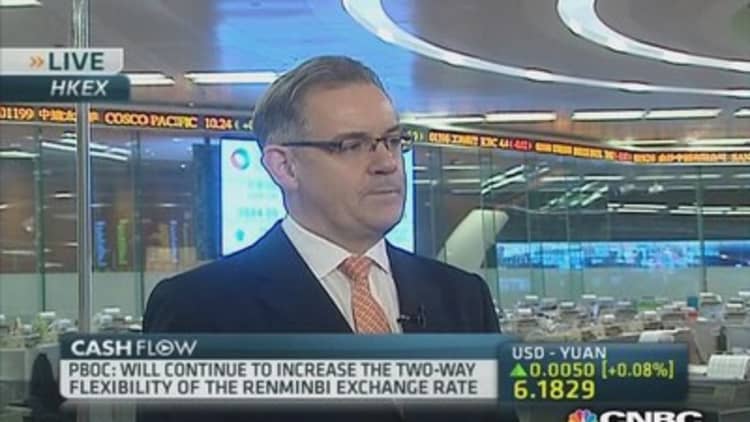
China's property sector is the main threat to the stability of the world's number-two economy, say economists, amid slowing growth in home prices and reports that a large mainland property developer is unable to repay its bank loans.
"As demand slows, more and more developers will feel financial strain. I'm concerned the default will trigger a string of similar distressed situations across weaker companies in the property sector," said Dariusz Kowalczyk, senior economist and strategist at Credit Agricole.
"Banks are heavily exposed to the property sector, so if there are a large number of defaults, banks would have set aside more funds for bad loans and would likely have to slow credit expansion. If those defaults make banks more risk averse, this would only slow growth further, as China's growth is funded by debt," he added.
(Read more: China's property market shows further signs of easing)
Average new home prices in major Chinese cities rose 8.7 percent on year in February, the National Bureau of Statistics said on Tuesday, cooling from a 9.6 percent rise in the previous month.
Meantime, Zhejiang Xingrun Real Estate has defaulted on almost $400 million worth of bank loans, according to media reports on Tuesday.
(Read more: Could this put a floor under China property prices?)
There have been increasing signs of strain in China's financial system in recent weeks. Last week, solar components maker Shanghai Chaori Solar Energy Science & Technology, became the first mainland company to default on a domestically-issued bond.
Local government officials have been meeting in recent days to determine how to deal with Zhejiang Xingrun's 2.4 billion yuan worth of bank debt and dispose of the developer's remaining assets, Dow Jones reported.
"This news supports our view that property sector overinvestment is currently China's top risk," Zhiwei Zhang, chief China economist at Nomura wrote in a report.
"As far as we know, this is the largest property developer in recent years that is at risk of bankruptcy," he added.
(Read more: China unveils sweeping plan to integrate farmers in cities)
Economists say more property developers will face similar pressures as transaction volumes slow and cash flow conditions tighten.
This problem is expected to be more severe for unlisted developers in third- and fourth-tier cities, which face limited access to financing and an oversupply problem. Third and fourth-tier cities accounted for 67 percent of housing under construction in China last year, according to Nomura.
China's third and fourth-tier cities are prefecture or country-level areas that are less developed and well-off compared to their bigger peers like Beijing and Shanghai.

"This risk does not seem fully recognized in the market partly because data are not readily available for these cities, and some investors may be misled by the boom in first-tier cities," Zhang said.
Nationwide, residential floor space per registered urban resident is forecast to have reached 37 square meters by 2013, compared with 35 in Japan and 33 in U.K., according to Nomura. And, if the current trend holds could reach 51 square meters by 2017.
"The ballooning supply in the pipeline will likely become increasingly difficult for incremental demand to absorb," Zhang said.
(Read more: Is China's property sector facing a day of reckoning?)
The property sector has become a pillar of growth for the mainland economy, accounting for 16 percent of gross domestic product, 33 percent of fixed asset investment and 26 percent of new loans in 2013, according to Nomura.
There are a many potential triggers for a correction in the property market including a rise in interest rates, an opening up of capital account or the introduction of a property tax.
"If it slows sharply, we see no obvious replacement to support growth," Zhang said.
—By CNBC's Ansuya Harjani. Follow her on Twitter @Ansuya_H


